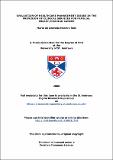Files in this item
Evaluation of healthcare management issues in the provision of clinical services for familial breast/ovarian cancer
Item metadata
| dc.contributor.advisor | Tavakoli, Manouche | |
| dc.contributor.advisor | Steel, C. Michael | |
| dc.contributor.author | de Azevedo Moreira Reis, Marta | |
| dc.coverage.spatial | 266 | en |
| dc.date.accessioned | 2009-07-24T13:45:17Z | |
| dc.date.available | 2009-07-24T13:45:17Z | |
| dc.date.issued | 2009-06-25 | |
| dc.identifier.uri | https://hdl.handle.net/10023/728 | |
| dc.description | Electronic version does not contain associated previously published material | |
| dc.description.abstract | Despite there being pragmatic national guidelines for assigning risk to women with a family history of breast cancer, the evidence base is still sparse. There are three major questions: First, how can an assignment of "low" risk be made most efficiently? Second, what are the actual outcomes for higher-risk women enrolled in special surveillance programmes? Third, what are the costs and benefits of current management of members of breast cancer families? My thesis reviews the evolution of clinical services for familial breast cancer and the existing literature in the field. I describe the gathering of information from the service records of the Tayside Breast Cancer Family History Clinic and from specific research exercises that involved collaboration with other centres in the UK and abroad. My findings are as follows: 1. Histories provided by the families are not sufficient to assign risk accurately. They must be extended and verified from other records by clinical geneticists. Women assigned a low risk can be informed by post, but some may require further support. The 2004 NICE guidelines for assigning risk are fairly accurate, but may under-estimate it for some women aged 45--55 years. 2. Annual screening of young women at increased risk results in detection of most cancers at a curable stage. Women who carry BRCA1 mutations fare less well, even when tumours are detected at an apparently early stage. 3. Costs of accurate risk assessment are outweighed by savings from the better targeting of surveillance programmes. Early cancer detection in young women enrolled in these programmes achieves a substantial gain in life expectancy at a cost of £3,700 per quality adjusted life year (QALY). Prophylactic surgery for carriers of BRCA1 mutations is highly cost-effective. The thesis concludes with a discussion as to how these findings might be extended and clinical practice improved in the future. | en |
| dc.format.extent | 30234655 bytes | |
| dc.format.mimetype | application/pdf | |
| dc.language.iso | en | en |
| dc.publisher | University of St Andrews | |
| dc.rights | Creative Commons Attribution-NonCommercial-NoDerivs 3.0 Unported | |
| dc.rights.uri | http://creativecommons.org/licenses/by-nc-nd/3.0/ | |
| dc.subject | Breast cancer | en |
| dc.subject | Health-care management | en |
| dc.subject | Screening | en |
| dc.subject | Family history | en |
| dc.title | Evaluation of healthcare management issues in the provision of clinical services for familial breast/ovarian cancer | en |
| dc.type | Thesis | en |
| dc.contributor.sponsor | Scottish Executive Health Department. Chief Scientist Office (CSO) | en |
| dc.type.qualificationlevel | Doctoral | en |
| dc.type.qualificationname | PhD Doctor of Philosophy | en |
| dc.publisher.institution | The University of St Andrews | en |
This item appears in the following Collection(s)
Except where otherwise noted within the work, this item's licence for re-use is described as Creative Commons Attribution-NonCommercial-NoDerivs 3.0 Unported
Items in the St Andrews Research Repository are protected by copyright, with all rights reserved, unless otherwise indicated.


